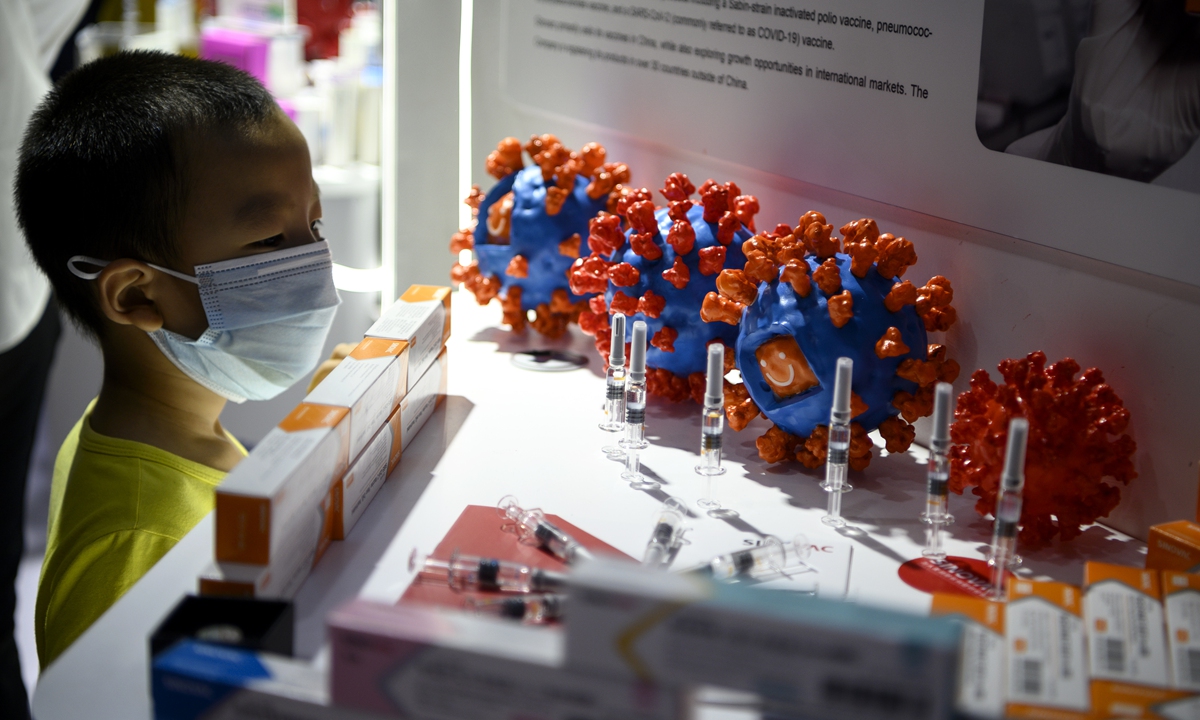Chinese company begins vaccine trials on minors; Xi’an denies inoculation
By Hu Yuwei Source: Global Times Published: 2020/9/8 21:58:43

A boy looks at Sinovac Biotech LTD's vaccine candidate for COVID-19 on display at the China International Fair for Trade in Services (CIFTIS) in Beijing on Sunday. Photo: AFP
A Chinese vaccine maker has begun COVID-19 vaccine clinical trials on minors to better understand the vaccine's safety and efficacy to a wider population, the Global Times learned on Tuesday.
The China National Biotec Group (CNBG) of SinoPharm, China's leading vaccine producer with two inactivated vaccine candidates for emergency vaccinations, told the Global Times on Tuesday it has started clinical trials on minors, and the data shows the vaccine is safe. The results are expected to be released after late-stage trials. The company did not release details of the trials.
As domestic vaccinations for emergency use are expanding, many speculated whether students will be the next group to be vaccinated against the coronavirus, as September marks the return to school.
Parents of students in Xi'an, Northwest China's Shaanxi Province, told the Global Times on Monday that some schools began counting how many parents would agree to have their children vaccinated with the domestic vaccines before their commercial release. Parents said the move has raised concerns among some over vaccine safety for children, as clinical data on minors has not been released.
The Health Commission of Shaanxi Province on Tuesday denied rumors that school students will receive the vaccine, telling the Global Times that the provincial CDC is investigating the willingness among key groups working in high-risk industries, such as medical workers, but not students.
An official of Jingxin Primary School in Xi'an said on Monday that they were told by the local CDC to collect the names of teachers who intend to join the vaccination for urgent use, considering that they would face a greater risk of infection after returning to school. The vaccine is on voluntary basis.
Chen Yinglong, a public relations director of SinoPharm, said that companies are now working with CDCs in many regions to expand the scope of emergency vaccinations. The company will extend production to 800 million to 1 billion doses by next year, Chen said.
Another Chinese vaccine maker, Sinovac, which has another promising inactivated vaccine entering Phase III clinical trials overseas, said that they are more cautious to apply doses on children. But the company will soon get an approval to start the clinical trials with underage groups.
The company's inactivated vaccine for urgent use is available only to people over the age of 18.
"Many parents are curious about whether it is safe to vaccinate their children, because of insufficient data. It seems that few parents are willing to have their children vaccinated before the vaccine is on the market," a middle school student's parent surnamed Liu said.
China has been very rigorous about vaccinating children, as the group faces a higher risk of side effects, Tao Lina, a Shanghai-based immunological expert, told the Global Times. However, some types of vaccines do not differentiate when applied to children and adults, because the mechanisms that cause immunity are similar, Tao said, adding that the maturity of inactivated vaccine technology gives more credit.
The expert also urged researchers to release data on the clinical trials on minors as early as possible to give the public a better understanding of the vaccine's target population and efficacy.
Posted in: SOCIETY